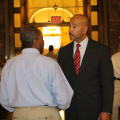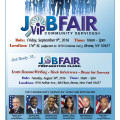Op-Ed by Fernando P. Tirado
Many politicians and other pundits have been critical of the “Gig Economy”, especially due to the rise of companies such as Uber and Airbnb. These companies are part of the gig economy, but the gig economy is certainly more diverse than just these online platforms. It isn’t even something new. A July article in the Huffington Post points out that the according to the US Census and the Department of Commerce, 80% of all U.S. businesses have no employees. Contractors, consultants, and freelancers are, and historically have been, a part of the gig economy.
The hostility that companies like Uber and Airbnb face from everyone like Mayor DeBlasio to U.S. Sen. Elizabeth Warren, who in May called for stricter regulation enforcement and imposing payroll taxes on temporary workers, is not that they create opportunities for people to work, but that these companies disrupt the traditional corporate model that feeds the platforms (and coffers) of politicians on both sides of the aisle. The protectionism that has arisen to defend these corporate business models has resulted in uncompetitive business practices that hurt poor people the most.
For the Bronx, and many other communities with high concentrations of poverty, too many people are shut out of or are marginalized by the traditional economy. A model that on paper reduces people to part-time status, but with full-time demands. A model that devalues labor, and whose pay rate has not kept up with the times (when factoring inflation, even if the proposed wage increase of $15 per hour were to happen today, it is only the equivalent of $6.75 in 1985 dollars). And finally, it is a model that fosters a mindset that the only path to economic stability is “a job” working for someone else.
While many people have always turned to gigs to help make ends meet, sometimes working two to three jobs, many people are taking advantage of the digital revolution and the economic opportunities it offers. The rise of a mobile workforce that is thriving over traditional brick and mortar is providing many with the opportunity to do what they love and what they are good at, without being tied down to a traditional 9-5 job that makes people feel more like a cog in a machine. And there is a big difference between deciding to be a part of the gig economy as opposed to being forced into it by large corporations more interested in pleasing shareholders.
What about the stability offered for professional positions? Yes, it is true that some office and professional positions offer benefits such as workman’s comp, unemployment insurance, and health coverage. But these are coming at a greater and greater cost to employees. Additionally, most Bronxites are not employed in the sectors that provide the most benefits. According to the US Census from 2010 through 2014, the top three industries employing residents of the Bronx are in health care and social assistance (129,675 civilians), retail trade (66,233), and accommodation and food services (50,938). The median income for Bronx residents? Slightly above $34,000 per year, with residents in the south and west Bronx making about 25% less. And these industries offer very little or no benefits at all.
The gig economy does require people to hustle more, and subjects them to greater economic fluctuations, but it also provides a more flexible, innovative, and competitive business environment, which benefits both small businesses and consumers. It eliminates the corporate middleman (and overcompensated CEO’s), expands social and economic capital, and makes us less dependent on corporate and political dominance.
With the digital age, there are many ways for individuals of all educational levels to take advantage of the gig economy. Sites like Taskrabbit (www.taskrabbit.com) offer “taskers” flexible opportunities to engage in hands on work for relatively good supplemental pay ($18-$22 per hour), with 90% of enrollees using the site as an income booster and not as a full time position. Other services such as Fiverr (www.fiverr.com) allow people with modest skills set to obtain gigs in everything from website design to marketing to translation services. Freelancer (www.freelancer.com) offers similar opportunities, with a greater diversity of skills demanded, such as business services, office administration, and even engineering services.
Many people are happy striking out on their own, offering their skills instead of just grinding day-by-day in a job that they may hate. This is especially true for recent retirees or those who are more free-spirited. Being a part of the gig economy is about putting value in yourself, something that fewer corporations, and even fewer politicians, recognize or value today. It may not be something that you can jump into right away, or all at once. I myself work full-time and operate a business part-time. And only time will tell which path will lead to your greatest happiness. But there is no hope for a better tomorrow without the will to back it up today.

















Follow Us